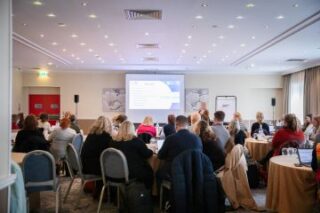Q Exchange
Making the Seemingly Impossible Possible: Demand & Capacity Changing Lives
- Proposal
- 2024

Meet the team
Also:
- Michael Rice
- Matthew O'Reilly
- Craig Reese
- Louise Norris
- Laura George
What is the challenge your project is going to address and how does it connect to the theme of 'How can we improve across system boundaries?
Integration of services across partner organisations and system boundaries is increasingly common. Successful outcomes require services to have a clear understanding of their pathways, flow, demand and capacity, and be able to apply key demand and capacity principles to make effective change that improves access, avoiding pitfalls which have potential to increase waits and delays. Complex integration requires skills that often aren’t well developed:
“People coming to operational roles are often clinicians by background. We (operational managers) don’t have the skills to tackle waiting lists or apply demand and capacity principles to fully understand a service”.
This project will work in partnership with the ICB, services across four merging Trusts and key stakeholders (Local Authorities and the Voluntary Sector). We will develop and evaluate a programme providing operationally driven and improvement focussed demand and capacity training and support for frontline teams, ensuring they have the skills to manage their service.
What does your project aim to achieve?
The key project aims are to:
- Design and deliver a novel demand and capacity training programme with the aim of supporting services to make system pathway changes with potential to optimise flow, manage demand, utilise capacity effectively, and consequently reduce waiting lists. Staff will gain skills and knowledge facilitating continuous proactive, data driven, service demand and capacity planning and management.
2. Facilitate, through partnership working with the Integrated Care Board and other key system partners, joint learning and understanding of complex models of care will lead to improved relationships, communication and joint problem solving.
3. Evaluate outcomes and impact of this training programme, collect lessons learned particularly around system level change, and make recommendations for next steps and the way forwards.
4. Publish programme content, case studies, learning and recommendations
The beneficiaries are service staff who will be empowered to use data to manage and improve services, patients and the broader healthcare system.
How will the project be delivered?
We will take a cohort approach supporting several teams to come together on four training days; augmented with ongoing project facilitation. We would expect services to put forwards a multi stakeholder team including operational and business support leads, team leaders, clinicians/ care professionals and a data analyst. We will strongly encourage representation from our ICB and input from service users.
We aim to support teams to take a whole service and system view; alongside key demand and capacity concepts we will also explore concepts such as job planning, the psychology of queuing, helping patients to wait well, co-production and systems thinking. We will introduce a range of tools to support demand and capacity calculations and scenario planning.
We will provide the demand and capacity, improvement and co-production expertise and external expertise to provide training on systems thinking.
Impact will be measured via case studies and key service measures.
How is your project going to share learning?
This project will include an evaluation for impact and shared learning – both in terms of process and the outcomes. We will produce a guide to programme content, hints and tips for other organisations wanting to provide a similar programme, and we will share critical factors support spread and sustainability. We will produce stories and case studies from participating teams. The evaluation and any resources will be available to any Q members, and we would like to share blogs and workshop content as the programme progresses.
How you can contribute
- Any ideas from anyone who has done something similar (particularly in community services) would be very helpful
Plan timeline
| 14 Jul 2024 | Programme design and scoping |
|---|---|
| 2 Sep 2024 | Start team recruitment process |
| 6 Oct 2024 | Finalise teams and start preparations with teams |
| 4 Nov 2024 | Training programme day 1 |
| 16 Dec 2024 | Training programme day 2 |
| 3 Feb 2025 | Training programme day 3 |
| 11 Mar 2025 | Training programme day 4 |
| 12 Mar 2025 | Post-programme evaluation commences |
| 1 Apr 2025 | Co-design of resources and case studies for sharing |
| 2 Jun 2025 | Publication of evaluation and resources |